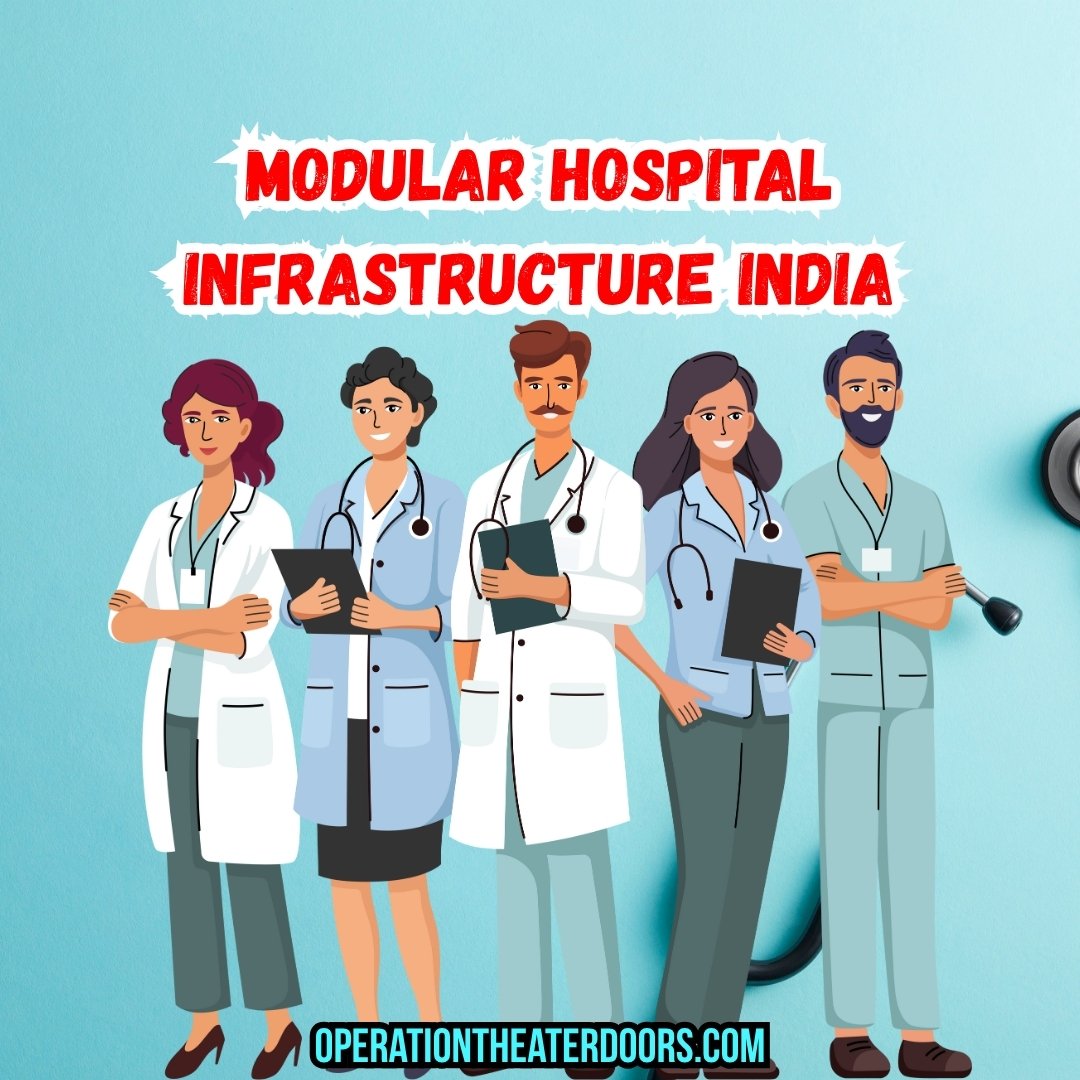
Hospitals push to handle more surgeries each year, yet traditional operation theaters often drag on construction timelines and rack up costs. Modular OTs change that equation. They assemble quickly, adapt easily, and align with strict standards like NABH and GMP. In Ahmedabad, where healthcare facilities expand rapidly to serve growing populations, these setups prove essential. As an operation theater door manufacturer in Gujarat, facilities turn to modular designs for efficient ICU setups and cleanroom solutions. This article dives into the top trends shaping modular OTs in 2025 and beyond. You will find practical advice on integrating operation theater doors, hermetical doors, and PUF insulated doors to boost performance and compliance.
The Shift Toward Customization in Modular OT Layouts
Customization tops the list of trends for modular operation theaters in 2025. Gone are the days of rigid, off-the-shelf designs. Instead, architects and contractors now tailor layouts to specific hospital needs, from general surgery suites to specialized IVF centers. This approach ensures every square foot serves a purpose, whether you run a diagnostic lab in Gujarat or a multi-specialty hospital in Ahmedabad.
Consider a typical modular OT setup. Teams start with core modules—walls, ceilings, and flooring—then add custom elements like integrated storage or adjustable lighting zones. For instance, a cardiac surgery OT might include wider access points for heavy equipment, while a pharma cleanroom demands tighter seals on all entry points. This flexibility cuts downtime during installation and allows future tweaks without full rebuilds.
What drives this trend? Rising demands for precision in turnkey projects. Hospital administrators seek designs that match patient flow and staff workflows exactly. In practice, customization starts at the planning stage. Consultants assess site constraints, like ceiling heights or HVAC routing, and build modules accordingly. The result? OTs that scale with your facility’s growth, often reducing build time by 40-50%.
To weave in robust entry solutions, pair custom layouts with specialized doors. An ICU door manufacturer in Ahmedabad crafts hermetical doors that seal perfectly against airflow disruptions. These doors use advanced gaskets to maintain positive pressure, crucial in modular setups where air quality dictates success.
Moreover, customization extends to aesthetics. Soft color schemes and ergonomic handles make spaces less intimidating for patients, while still meeting WHO guidelines on healthcare environments. Facilities in Gujarat report higher staff satisfaction when OTs feel personalized rather than cookie-cutter.
For deeper insights into modular builds, explore our modular operation theatres services. And for global benchmarks, check the NABH standards for infrastructure.
Benefits of Tailored Modular Designs for Indian Hospitals
Indian hospitals benefit most from this trend due to diverse needs. A small surgical center in Ahmedabad might customize for minimal footprint, using stackable panels that double as sound barriers. Larger chains, meanwhile, standardize modules across sites but tweak for local regulations.
Contractors find value in prefabrication. Factories pre-assemble components, so on-site work focuses on connections. This method minimizes dust exposure, vital in existing facilities. One Gujarat hospital upgraded its OT using custom PUF panels, slashing energy bills through better insulation.
Transitioning to the next point, customization pairs well with tech upgrades. When you design around smart systems, the entire OT evolves into a responsive space.
Challenges and Solutions in Custom Builds
Not every project runs smoothly. Supply chain delays can hit custom orders hard. Solution? Partner with local manufacturers who stock core materials. In Ahmedabad, quick-turnaround PUF insulated doors keep timelines tight.
Budget overruns loom too. Start with a detailed scope document to lock in costs early. NABH consultants recommend phased customization—core structure first, then add-ons—to spread expenses.
Smart Integration: IoT and Automation in Modular OTs
Smart technology transforms modular OTs from static rooms into dynamic hubs. By 2025, IoT sensors and automation software become standard, monitoring everything from air quality to equipment usage. Hospital doors, like cleanroom flush doors, now link to these systems for seamless access control.
Picture this: A surgeon approaches the OT, and RFID badges trigger lights to brighten while HVAC ramps up filtration. Automation handles the rest—adjusting temperatures based on procedure type or alerting maintenance for filter clogs. This setup not only boosts efficiency but also cuts human error in high-stakes environments.
In India, where NABH pushes for traceable processes, smart integration shines. Pharma QA teams track door cycles to ensure compliance, while ICU setups use sensors to maintain laminar flow. Turnkey projects increasingly bundle these features, making adoption straightforward for contractors.
Key components include wireless networks embedded in PUF panels. These panels house cabling without compromising sterility. For entry points, pharma doors with touchless sensors reduce contamination risks. Facilities report 20-30% fewer breaches after installing such systems.
Automation extends to predictive maintenance. Software analyzes usage data to forecast repairs, preventing mid-surgery failures. In Gujarat’s humid climate, this proves invaluable for HVAC components tied to hermetical doors.
Dive into our cleanroom solutions for automation-ready options. For foundational guidelines, refer to the Ministry of Health and Family Welfare’s digital health framework.
How IoT Enhances Daily Operations
Staff navigate OTs faster with automated routing. Displays show real-time bed availability or supply levels. Patients benefit too—integrated monitors provide procedure updates, easing anxiety.
In diagnostic labs, IoT links to imaging suites, syncing lights and air for hybrid procedures. This trend accelerates adoption in IVF centers, where precision timing matters.
Overcoming Integration Hurdles
Connectivity issues plague older buildings. Opt for modular upgrades that retrofit IoT without rewiring. Training forms another barrier; short workshops equip teams quickly.
Budget wisely—start with core sensors, then scale. ROI appears in months through reduced waste and faster turnarounds.
Sustainability at the Core: Eco-Friendly Materials in Modular Designs
Sustainability moves beyond buzz in 2025 modular OTs. Designers prioritize recyclable materials and energy-saving features to lower carbon footprints. PUF insulated doors lead here, offering superior thermal resistance with minimal environmental impact.
Modular setups inherently support green practices. Prefabrication cuts on-site waste by 70%, and reusable panels allow disassembly for relocation. Hospitals in Ahmedabad adopt these to meet green building certifications, appealing to eco-conscious investors.
Energy efficiency starts with walls. PUF panels trap heat better than traditional drywall, reducing HVAC loads. Pair them with LED lighting and solar-compatible roofs for net-zero potential. In Gujarat’s hot summers, this slashes cooling costs by up to 25%.
Water conservation joins the mix. Low-flow fixtures and greywater systems integrate into modular plumbing. For doors, cleanroom doors with recycled aluminum frames minimize material use without sacrificing durability.
Compliance ties in naturally. NABH encourages sustainable infrastructure, and WHO highlights eco-designs for resilient health systems. Turnkey projects now include lifecycle assessments to quantify benefits.
Explore energy-efficient choices in our PUF insulated doors. Learn more from the WHO’s sustainable healthcare guidelines.
Practical Steps for Green Modular OTs
Assess your site’s energy profile first. Solar audits reveal quick wins, like panel-integrated photovoltaics. Source local materials—Gujarat’s PUF suppliers cut transport emissions.
For pharma units, biodegradable sealants on hermetical doors extend sustainability. Track progress with annual audits to refine designs.
Measuring Long-Term Savings
Initial costs run higher, but payback periods shorten to 3-5 years. Hospitals report lower utility bills and easier NABH renewals. In cleanroom solutions, sustainable filters last longer, reducing replacements.
Advanced Infection Control: HEPA and Beyond in Modular OTs
Infection control defines modular OT success, especially post-pandemic. 2025 trends emphasize layered defenses, from HEPA filtration to antimicrobial surfaces. Operation theater doors form the first line, with seamless seals preventing microbial ingress.
Modular designs excel here. Prefab walls install with minimal joints, ideal for positive pressure zones. HVAC systems with HEPA filters achieve ISO 5 cleanliness, vital for surgical units. In Ahmedabad hospitals, this setup halves infection rates.
Antimicrobial coatings on panels and doors kill bacteria on contact. Copper-infused handles on ICU doors add another layer. Automation monitors particle counts, alerting teams to anomalies.
For cleanrooms, pharma doors with vision panels use laminated glass that resists fogging and microbes. Turnkey projects integrate these seamlessly, ensuring GMP compliance from day one.
NABH mandates rigorous protocols, and modular OTs meet them effortlessly. Consultants verify airflow patterns during validation, confirming door integrity.
See specialized doors in our operation theatre doors. Consult NABH’s infection control standards.
Integrating Filtration with Door Systems
Doors must align with HVAC. Hermetical doors maintain seals during openings, preserving HEPA efficacy. Test cycles ensure no leaks.
In ICU setups, laminar flow hoods pair with fire exit doors that self-seal post-emergency. This holistic approach protects vulnerable patients.
Innovations in Antimicrobial Tech
Nanotech coatings evolve rapidly. Labs in Gujarat test door-embedded UV lights for continuous disinfection. Cost drops make them accessible for smaller facilities.
Flexible Layouts: Scalability for Evolving Healthcare Needs
Flexibility future-proofs modular OTs. 2025 designs allow reconfiguration without demolition, suiting expanding hospitals. ICU doors slide or swing to adapt spaces on demand.
Modules snap together like building blocks. Add bays for new specialties or shrink for underuse. This scalability supports turnkey expansions in Gujarat’s booming healthcare sector.
Walls shift via tracks, and ceilings adjust for equipment. PUF panels disassemble quietly, minimizing disruption. Architects plan for 10-20% growth, embedding expansion joints.
Patient-centric tweaks include wider corridors for bariatric needs. Emergency exit doors integrate flush, maintaining aesthetics while ensuring quick evacuations.
In diagnostic labs, flexible OTs host imaging one day, endoscopy the next. NABH applauds this adaptability for efficient resource use.
Discover scalable options in our ICU setup services. Review Ministry guidelines on facility planning.
Strategies for Scalable Design
Map growth projections early. Modular grids allow 20% space increases. Gujarat contractors use 3D modeling to visualize changes.
Budget for phased scaling—core OT first, extensions later. This keeps cash flow steady.
Real-World Adaptations
A Ahmedabad hospital reconfigured its OT for robotics, adding door reinforcements. Downtime lasted days, not weeks. Such stories highlight modularity’s edge.
Why These Trends Matter for Ahmedabad and Gujarat Facilities
Ahmedabad’s healthcare scene thrives on innovation, with new hospitals and pharma units sprouting along the Sarkhej-Gandhinagar Highway. Modular OTs fit perfectly, offering quick setups amid urban constraints. As an ICU door manufacturer in Gujarat, we see local facilities prioritize trends like customization to handle monsoon-season delays.
Gujarat leads in cleanroom solutions for electronics and F&B sectors. Trends in HEPA filtration and smart doors ensure compliance for export-oriented plants. Hospital administrators here value turnkey projects that blend local sourcing with global standards.
Operation theater door manufacturers in Ahmedabad stock PUF panels tailored to regional humidity, preventing mold in modular builds. NABH consultants push for these integrations, knowing they speed accreditation.
Pharma doors and cleanroom flush doors dominate IVF centers in the state, where sterility trumps all. Emergency exit doors meet fire codes while supporting HVAC balance.
Local advantages shine: Shorter lead times from Gujarat factories cut import hassles. Facilities report 15-20% savings on logistics alone.
For regional expertise, visit our industries we serve. Explore Gujarat Health Department’s infrastructure push.
FAQs
What Are the Key NABH Compliance Requirements for Modular OTs?
NABH demands seamless, non-porous surfaces in modular OTs to curb infections. Hospitals must install dedicated AHUs with HEPA filtration, avoiding split ACs. Antifungal paints and touchless operation theater doors ensure sterility. Gujarat facilities often add anti-static flooring for safety. Consultants verify these during audits to grant accreditation.
How Do Modular OT Designs Improve Infection Control in Hospitals?
Modular OTs use prefabricated panels with minimal joints, perfect for positive pressure. HEPA filtration captures 99.97% of particles, while hermetical doors seal tightly on close. Antimicrobial coatings on PUF insulated doors kill bacteria instantly. In Ahmedabad setups, this combo drops SSIs by 30%. Regular validation keeps systems optimal.
Why Choose PUF Insulated Doors for ICU Setups?
PUF insulated doors provide top thermal barriers, maintaining stable temperatures in ICUs. They insulate against noise and humidity, common in Gujarat. Lightweight yet durable, these doors install fast in turnkey projects. NABH compliance comes built-in with seamless edges. Hospitals save on energy while ensuring patient comfort.
What Role Do Cleanroom Doors Play in Pharma Modular OTs?
Cleanroom doors prevent contaminant entry with airtight seals and flush designs. Vision panels allow monitoring without breaks in sterility. In pharma units, they support ISO class compliance alongside HVAC. Ahmedabad manufacturers customize sizes for tight spaces. Touchless options reduce hand contact, aligning with GMP.
How Long Does Installation Take for a Turnkey Modular OT Project?
Turnkey modular OT projects wrap in 4-8 weeks, versus months for traditional builds. Prefab components arrive ready-to-assemble, with doors and panels snapping in place. Gujarat teams handle site prep in parallel to speed things. Factors like custom ICU doors add days, but overall, it’s efficient. Post-install validation takes another week.
What Costs Should Hospitals Expect for Modular OT Upgrades?
Basic modular OTs start at INR 50-70 lakhs, scaling with size and features. Add 10-15% for smart integrations or PUF panels. In Ahmedabad, local sourcing trims freight costs. Turnkey packages bundle HVAC and doors for predictability. Long-term savings from efficiency offset upfront spends within 2 years.
How to Integrate HVAC with Operation Theater Doors in Modular Setups?
HVAC ties directly to door seals for balanced airflow. Hermetical doors use interlocking frames to hold pressure. Install sensors on cleanroom doors to sync with AHUs. Gujarat experts recommend CFD modeling pre-build. This ensures NABH-level performance without leaks.
Are Fire Exit Doors Compatible with Cleanroom Modular OTs?
Yes, fire exit doors fit modular OTs with intumescent seals that expand in heat. They maintain room integrity until safe evacuation. In Gujarat hospitals, panic hardware adds quick release. Pair with PUF cores for insulation. Compliance checks confirm they don’t compromise HEPA flow.
Wrapping Up: Build Smarter OTs for Tomorrow’s Challenges
Modular OTs in 2025 blend customization, smarts, sustainability, infection defenses, and flexibility into resilient spaces. These trends help Gujarat hospitals meet rising demands while staying compliant and cost-effective. Operation theater doors and ICU solutions anchor it all, ensuring seamless function.
Ready to upgrade? Hospitals, pharma teams, and contractors—reach out for tailored advice on turnkey projects or cleanroom solutions. As a trusted provider, AUM Industries delivers quality from Ahmedabad. Contact Amit Kumar Shrivastav at +91-9274313580 or amit@aumindustriesmfg.com to start your modular journey.






